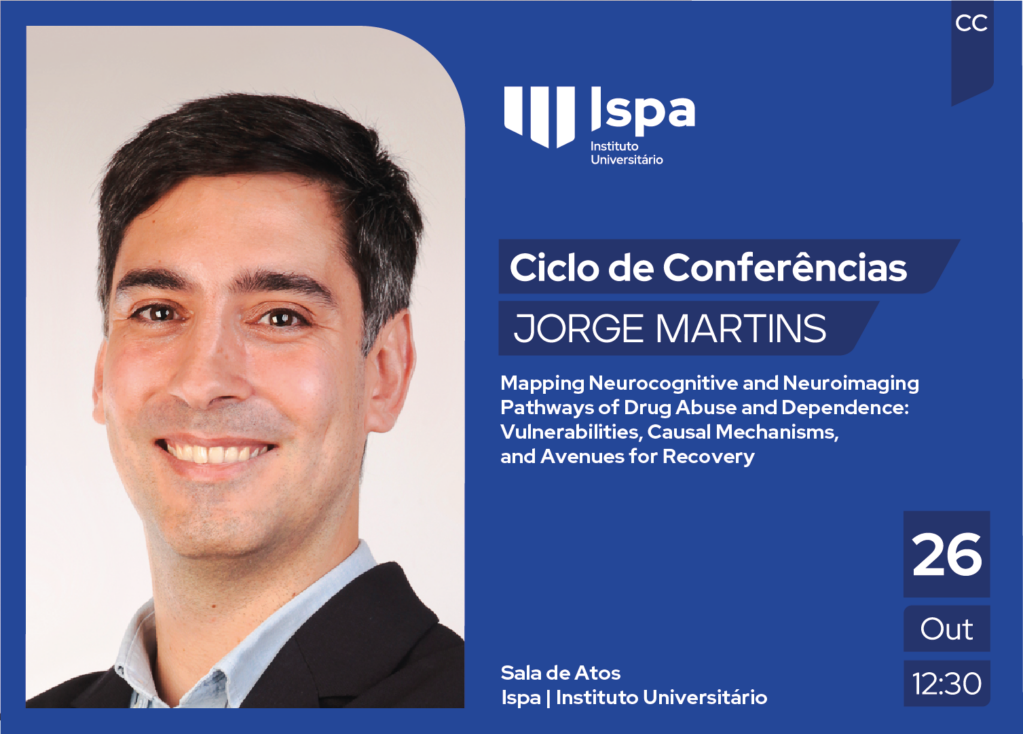O Ciclo de de Conferências do Ispa está de volta com a palestra Mapping Neurocognitive and Neuroimaging Pathways of Drug Abuse and Dependence: Vulnerabilities, Causal Mechanisms, and Avenues for Recovery de Jorge Martins, investigador do William James Center for Research (WJCR), no Ispa -Instituto Universitário.
Entrada Livre.
Abstract
Addiction is a major public health issue because of its societal costs and global disease burden. My talk will focus on unraveling the processes that underlie drug addiction, primarily focusing on research aimed at informing more effective intervention efforts for tackling the pressing societal problem of addiction. First, I will review the core assumptions of the most influential theoretical perspectives of addiction, focusing on alcohol use as a prototypical exemplar of a broader class of addictive behaviors. Second, I will present data shedding light on why some people become addicted to alcohol and drugs while others do not. Next, I will discuss preliminary results from a longitudinal and genetically-informed study exploring the changes alcohol use brings to the brain and how these changes may contribute to setting the stage for addiction. Then, I will present neuroimaging data from treatment-seeking adults with current DSM-5 Alcohol Use Disorder, providing new insights into why it is so difficult to stop and recover from addiction. Finally, I will summarize the main take-home messages and propose new directions for future research aimed at understanding the pathophysiology of drug addiction, as well as its prevention and treatment.
Biografia
Dr. Martins obtained a Bachelor’s and Master’s degree in Psychology at the University of Coimbra in 2010. He received his Ph.D. from the University of Missouri-Columbia (U.S.A.)in 2020, with an emphasis on Psychology, Clinical Neuroscience, and Addiction Science, and two years of postdoctoral training at Yale University, where he worked in clinical science research specific to studying the pathophysiology of addiction and avenues for recovery. In 2022, he accepted a position as a Postdoctoral Researcher at the William James Center for Research (WJCR) at Ispa -Instituto Universitário, a position supported by Ispa and the Fundação para a Ciência e Tecnologia (FCT).
Dr. Martins’ program of research combines contemporary theory, statistical modeling, and a multi-method neuroscientific approach to further understanding the underlying causes contributing to abnormal behaviors, including alcohol and drug addiction. The translation of basic science and the intersection of clinical and health psychology with cognitive & clinical neuroscience lies at the heart of his research interests. His research focuses on understanding the complex interplay between distinct neurobehavioral traits, such as reward processing, cognitive control, and stress physiology, and how such traits explain the wide heterogeneity in clinical features of addiction. His research addresses three fundamental questions in addiction research: (1) Why do some people become addicted to drugs and alcohol while others do not? (2) What are the effects of alcohol and drugs on the brain-body? and (3) Why is it so difficult to change or stop addictive behaviors and recover from drug and alcohol dependence? More broadly, his research attempts to leverage knowledge from multiple disciplines and lines of work to generate findings that can inform better evidence-based interventions for promoting the prevention and treatment of substance use disorders. Specifically, Dr. Martins is interested in establishing a translational program of research that can inform efforts for tackling pressing societal problems such as addiction and other abnormal behaviors. His research to date uses statistical modeling (e.g., machine learning) and multimodal neuroimaging methods–including electroencephalography (EEG) and event-related potentials (ERPs); electrocardiography (ECG); and voxel-based, whole-brain functional magnetic resonance imaging (fMRI) analysis and brain connectivity–to the understanding of the underlying causes contributing to the susceptibility for addiction and wide heterogeneity in addiction treatment outcomes.
Dr. Martins has authored and co-authored several articles in peer-reviewed journals. His work has been published in the top-tier journals in the field of addiction and alcohol research, including Psychology of Addictive Behaviors, Experimental & Clinical Psychopharmacology, Alcoholism: Clinical & Experimental Research, Addiction, Addictive Behaviors, Addiction Biology, and Drug & Alcohol Dependence. Dr. Martins has also been very active in presenting his work, at national and international meetings. Presentation of his work at scientific meetings has been supported by competitive departmental and campus-wide awards, and travel funding sponsored by academic societies (e.g., American Psychological Association, Research Society on Alcoholism, and Society of Personality and Social Psychology) and federal or government funding agencies such as the U.S. National Institute of Health (NIH) and Fundação para a Ciência e Tecnologia (FCT). Finally, Dr. Martins has participated in various outreach initiatives. He has recently joined the Early-Career Investigator & Communication Committee at the European Society for Biomedical Research on Alcoholism, and he is serving as Associate Editor for the Journal of Emerging Investigator, thus helping and empowering the new generation of scientists.



